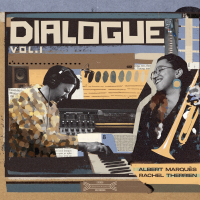Home » Jazz Articles » Album Review » Clark Terry: Porgy & Bess
Clark Terry: Porgy & Bess
That is, until now.
Trumpeter and flugelhornist Clark Terry replaces Davis, his former protégé, as the soloist on the Chicago Jazz Orchestra's rendition of the Evans Porgy and Bess arrangements. Terry is an inspired choice by the orchestra's conductor Jeff Lindberg because Davis employed both the trumpet and flugelhorn on his version.
But the merit of revisiting an acknowledged jazz classic remains dubious.
That's because Evans and Davis completely transformed the opera into a personal statement. The opera relied on its folk, blues, and gospel origins to create a communal sound. The Evans/Davis version moved Davis to the front. Instead of characters singing arias on a stage, there was Davis employing his melancholic middle-register on introspective improvisations draped in dark, enigmatic hues.
Terry's approach, however, returns the music to its theatric origins by assuming the guise of the opera's characters. In "Buzzard Song," "Bess, You Is My Woman Now," and "Bess, Oh Where's My Bess?" Terry evokes Porgy through carefree swinging, lovelorn blues bends, and vengeful appoggiaturas. The approach catches fire on "Prayer (Oh, Doctor Jesus)" where Terry simultaneously conveys the solemnity and passion of a preacher praying for divine healing.
On "It Ain't Necessarily So" and "There's a Boat That's Leaving Soon for New York," Terry drops the acting to the detriment of the record. He plays wonderfully on both of these swinging cuts, but they throw the listener out of the story. In the opera, these songs are spotlights for Sporting Life—the drug dealer who steals Bess away from Porgy with dope. Terry's straightforward exuberance fails to convey Sporting Life's devilishness.
But the quirky musical choices on the rest of the album make up for these faults. The sharp swing of "Gone" features great drumming by George Fludas and a wonderful flugelhorn duet between Clark and veteran Chicago brassman Art Hoyle. Terry's bluesy mumbling vocals on "Here Come De Honey Man" add an unexpected and delightful dimension to the short piece. On the rearranged "I Loves You, Porgy," Terry plays some sweet melodies before switching to swinging improvisations.
In the end, the new Porgy and Bess is a strong performance of the Gil Evans arrangements despite its occasional flaws. The quality playing and highly individualized musical choices make this album worthwhile.
Track Listing
Buzzard Song; Bess, You is My Woman Now; Gone; Gone, Gone, Gone; Summertime; Bess, Oh Where's My Bess; Prayer (Oh, Doctor Jesus); Fishermen, Strawberry and Devil's Crab; My Man's Gone Now; It Ain't Necessarily So; Here Come De Honey Man; I Loves You, Porgy; There's a Boat That's Leaving Soon for New York
Personnel
Clark Terry
trumpetClark Terry (solo trumpet, flugelhorn, vocal on "Here Come De Honey Man")
With the Chicago Jazz Orchestra: Jeff Lindberg (artistic director and conductor), John Wojciechowski (alto saxophone), Darlene Drew (alto flute, piccolo), Jerry DiMuzio (alto flute, bass clarinet), Kimberly Risinger (bass flute, flute), Larry Combs (b-flat clarinet, bass clarinet), William Overton (bass clarinet), Randy Salman (b-flat clarinet, bass clarinet), Greg Flint (French horn), Neil Kimel (French horn), Angela DeBoer (French horn), Christine Worthing (French horn replacing Neil Kimel on "Buzzard Song," "Summertime"), Danny Barber (trumpet), Kirk Garrison (trumpet, replaces Danny Barber on lead trumpet on "Buzzard Song"), Doug Scharf (trumpet), Art Davis (trumpet), Art Hoyle (trumpet), Brent Turney (trumpet, replaces Danny Barber on lead trumpet on "Summertime"), Scott Bentall (trombone), Tim Coffman (trombone), Andrew Baker (trombone), Michael Young (bass trombone), Daniel Anderson (tuba), Dennis Carroll (bass), Rob Kassinger (bass, replacing Dennis Carroll on "Prayer (Oh Doctor Jesus)"), George Fludas (drums)
Album information
Title: Porgy & Bess | Year Released: 2004 | Record Label: A440 Music
Tags
PREVIOUS / NEXT
Support All About Jazz
 All About Jazz has been a pillar of jazz since 1995, championing it as an art form and, more importantly, supporting the musicians who make it. Our enduring commitment has made "AAJ" one of the most culturally important websites of its kind, read by hundreds of thousands of fans, musicians and industry figures every month.
All About Jazz has been a pillar of jazz since 1995, championing it as an art form and, more importantly, supporting the musicians who make it. Our enduring commitment has made "AAJ" one of the most culturally important websites of its kind, read by hundreds of thousands of fans, musicians and industry figures every month.





















